With over 31% of projects failing to meet their original deadlines (according to the Project Management Institute), project delays can wreak havoc on budgets, stakeholder trust, and overall business objectives. And yet, understanding the underpinnings of these delays remains elusive to many.
This article delves into the whys and hows, offering you insights and tools to master the challenges of project delays.
In the dynamic world of project management, understanding the anatomy of these delays isn’t just beneficial; it’s essential. Dive in, and arm yourself with the knowledge to turn potential setbacks into strategic pivots.
What Do We Mean by Project Delays?
Project delays stand as one of the primary concerns in project management. In essence, they refer to any disruption or delay in the planned timeline of a project.
While ‘project delay’ is a broad term, ‘project playtime delay’ specifically refers to postponements in phases meant for testing, iterations, or final reviews, which are often the finishing touches before a project’s launch.
In essence, timely project completion is vital, and understanding the reasons for delays is the first step in preventing them.
Why Delays Happen: Unpacking the Root Causes
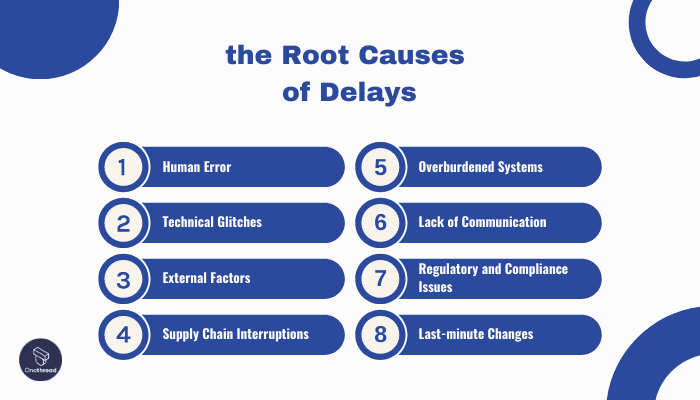
In our fast-paced world, punctuality and swift deliveries are not just desired but often expected. Yet, despite technological advancements and well-designed systems, delays remain a pervasive issue. Why is that? Let’s take a dive into the root causes behind these unexpected hold-ups.
1. Human Error
Humans are an integral part of any process, but with that comes the potential for mistakes. A misplaced document, a wrong data entry, or even a misunderstood communication can lead to significant delays. These errors, while often unintentional, can have a ripple effect, especially in systems that heavily rely on sequential processing.
2. Technical Glitches
We live in a digital era, but that doesn’t make technology foolproof. Software can crash, servers can go down, and machinery can malfunction. Even a minor glitch can lead to hours, if not days, of backlog, particularly in industries dependent on real-time data or continuous production lines.
3. External Factors
Often, the reasons for delay are beyond an organization’s control. Natural disasters like floods, hurricanes, or earthquakes can disrupt normal operations. Similarly, unexpected events, like a global pandemic or political unrest, can halt processes altogether.
4. Supply Chain Interruptions
In an interconnected global market, a hiccup in one part of the world can cause delays in another. If a supplier fails to deliver a component on time, it can postpone the entire production process. Additionally, transportation issues, be it a grounded flight or a cargo ship stuck in a canal, can push back expected delivery times significantly.
5. Overburdened Systems
Sometimes, the infrastructure in place can’t keep up with the demand. This overburden can be due to a sudden surge in demand, inadequate resources, or even poor planning. When systems are overloaded, it inevitably leads to slowdowns and, consequently, delays.
6. Lack of Communication
Effective communication is the backbone of smooth operations. When there’s a breakdown in communication, be it within a team, between departments, or with external stakeholders, it can lead to misunderstandings and, ultimately, delays.
7. Regulatory and Compliance Issues
Many industries are bound by regulations that require rigorous checks and approvals. While these steps are crucial for quality control and public safety, they can be time-consuming. Any discrepancies or non-compliance can cause further hold-ups.
8. Last-minute Changes
Whether it’s a change in client requirements, a design alteration, or a shift in strategy, last-minute changes can throw a wrench in the works. Adapting to these changes requires recalibration, often leading to extended timelines.
By understanding these root causes, organizations can take proactive measures to mitigate them, ensuring smoother operations and timely deliveries. However, it’s also essential to acknowledge that not all delays are avoidable. In such cases, clear communication and transparency become key to managing expectations and navigating the challenges effectively.
The Real Consequences: Impact of Delays on Projects
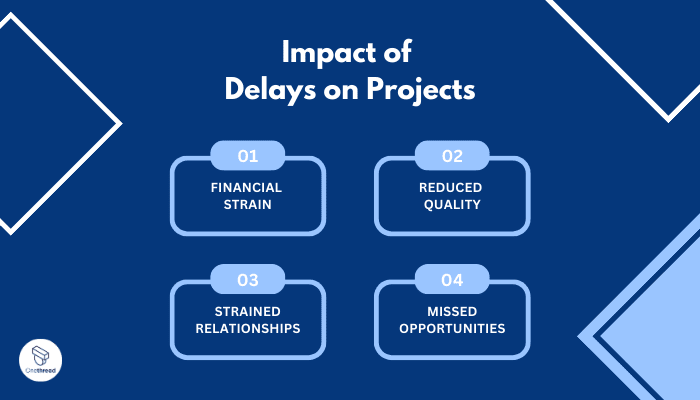
Delays are more than just mere inconveniences; they carry tangible repercussions. When a project timeline goes astray, it’s not only the immediate task that’s affected. The ripple effect can influence stakeholders, budgets, and even an organization’s reputation. Here’s a closer look at the real-world consequences of project delays.
1. Financial Strain:
Every day a project is delayed can translate to monetary losses. These could manifest as increased labor costs, penalties for late completion, or lost opportunities. Additionally, elongated timelines often require additional resources, adding to the overall expenditure.
2. Reduced Quality:
In an attempt to hasten delayed projects, there’s sometimes a rush in the final stages. This hurried approach can lead to errors, oversights, and a compromised end product.
3. Strained Relationships:
Delays can lead to tensions between clients, contractors, and teams. Broken promises and missed deadlines can erode trust, making future collaborations difficult.
4. Missed Opportunities:
A delayed project can mean missing out on market opportunities, especially in industries where timing is everything. For instance, a product launched after a major seasonal sale might not get the same traction.
While delays are often seen as mere timeline extensions, their true impact is much deeper. They can alter the very fabric of a project’s objectives, turning profitable ventures into costly endeavors.
Proactive Measures: How to Avoid Project Delays

Projects are the lifeblood of many industries, driving innovation, growth, and success. However, they’re also prone to delays, which can cascade into larger operational and financial issues. To maintain momentum and trust, it’s vital to adopt proactive measures. Here are effective measures that can steer your projects clear of unnecessary delays.
1. Robust Planning
The foundation of any project lies in detailed and realistic planning. Prioritizing tasks, allocating resources efficiently, and setting achievable milestones can make all the difference. Every project plan should also have a buffer, considering unexpected hiccups.
2. Clear Communication
Establish clear communication channels among team members, stakeholders, and clients. Regular updates can prevent misunderstandings and ensure everyone is aligned with the project’s progress and objectives.
3. Risk Assessment
Identify potential risks early. Analyzing these risks allows teams to devise strategies to circumvent or mitigate them. Be it technical challenges, resource shortages, or external factors, being prepared is half the battle won.
4. Prioritize Resource Allocation
Ensure that critical project components have the necessary resources. This involves human resources, tools, finances, and materials. Ensuring these are in place and ready to be deployed can avoid unnecessary downtime.
5. Use Technology Wisely
Adopt project management tools that offer real-time tracking, collaborative features, and alert mechanisms. Tools like Trello, Asana, or Microsoft Project can be invaluable in maintaining project pace and identifying bottlenecks early.
6. Regular Monitoring
Review the project’s progress at regular intervals. These check-ins can be daily, weekly, or monthly, but they offer an opportunity to recalibrate plans if necessary.
7. Stakeholder Engagement
Keep stakeholders in the loop. Their feedback and insights can be invaluable in steering the project away from potential pitfalls.
8. Foster a Problem-solving Culture
Encourage team members to approach challenges proactively. A culture that rewards problem-solving and innovation can quickly address and rectify issues that might lead to delays.
9. Continuous Training
Equip your team with the latest skills and knowledge. A well-trained team can adapt to changing project landscapes more efficiently, reducing the chances of delays.
10. Flexibility
While sticking to plans is essential, there are times when adapting to changes can prevent larger issues down the line. Being open to revising strategies, when warranted, can keep projects on track.
11. Collaborative Decision Making
Encourage a culture where team members feel comfortable sharing insights and concerns. Collaborative decision-making can bring diverse perspectives to the table, leading to well-rounded strategies that foresee and counteract potential delays.
So, the key to avoiding project delays lies in meticulous planning, continuous monitoring, and fostering open communication. With these proactive measures in place, you can ensure that your projects not only meet their deadlines but also stand up to the quality and standards expected of them. Always remember that in project management, foresight isn’t just beneficial but essential.
How to Manage and Overcome Existing Delay?
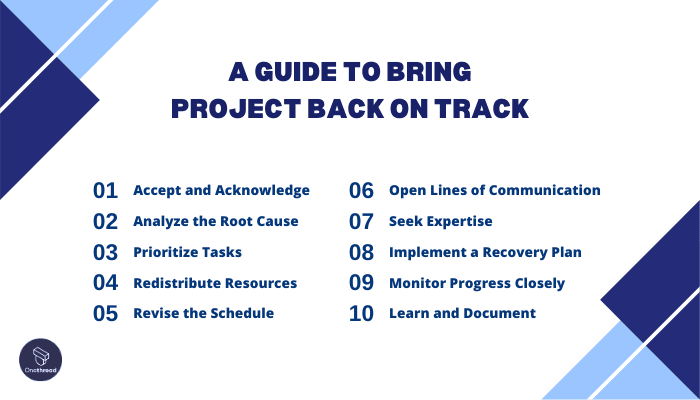
Even with the best-laid plans, delays can creep into a project. The key isn’t just preventing them but also effectively managing them once they arise. Here’s a guide to maneuver through existing delays and bring your project back on track.
1. Accept and Acknowledge:
Before anything else, it’s crucial to accept that a delay has occurred. Avoiding or downplaying it only exacerbates the issue. Inform stakeholders promptly, ensuring transparency.
2. Analyze the Root Cause:
Identify what caused the delay. Was it a resource shortage? Did a critical task take longer than anticipated? Pinpointing the reason helps address the issue at its core.
3. Prioritize Tasks:
Look at the project tasks at hand. Decide which ones are critical to the project’s success and which can be temporarily sidelined. Focus on the essential tasks to regain momentum.
4. Redistribute Resources:
If certain tasks are lagging, consider reallocating resources to expedite them. This may mean shifting personnel or budget to crucial areas of the project.
5. Revise the Schedule:
Adjust the project timeline based on the delay. This doesn’t just mean pushing dates forward. It might involve overlapping tasks where possible or assigning more resources to specific phases.
6. Open Lines of Communication:
Ensure all team members are updated about the delay and the changes being made to address it. Clear communication prevents further misunderstandings and aligns everyone towards a common goal.
7. Seek Expertise:
If the delay stems from a specific challenge, consider bringing in an expert in that area. Their insights and experience can help you navigate the challenge more efficiently.
8. Implement a Recovery Plan:
Craft a detailed plan to recover from the delay. This might involve extra work hours, additional resources, or outsourcing specific tasks (such as design work, content creation, or custom software development). Share this plan with stakeholders to set new expectations.
9. Monitor Progress Closely:
With the recovery plan in place, monitor its execution closely. Regular check-ins, progress reports, and team meetings can keep the recovery efforts focused and on track.
10. Learn and Document:
Once the project is back on course, review the delay and its management. Document the lessons learned. This not only helps in future projects but also strengthens your project management skills.
Delays, while unwelcome, are a part of the project management landscape. However, with a proactive approach to managing and overcoming them, you can steer your projects back to success. Remember, resilience and adaptability in the face of setbacks often define the success of a project manager more than flawless execution. Always be ready to pivot, adjust, and push forward.
How Onethread Helps You Minimize Project Delays
In the intricate world of project management, having the right tools is key. And that’s where Onethread shines. This powerful project management software is a force multiplier in managing and minimizing project delays. Here’s how:
Enhanced Planning: Onethread helps you chart your project’s course with robust planning tools. Define clear goals, create comprehensive roadmaps, and assign specific roles. With everything mapped out, you’re less likely to drift off course.
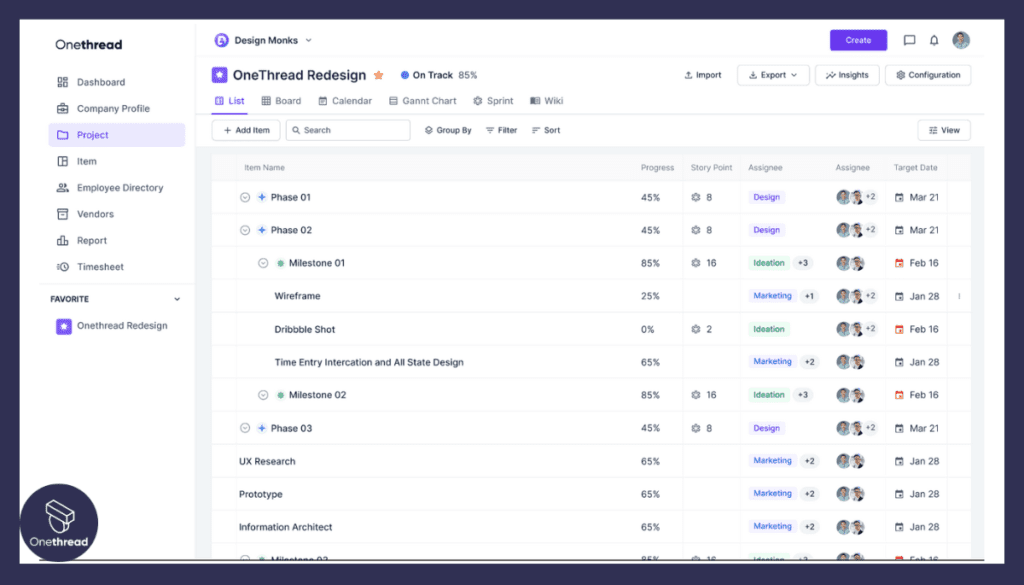
Resource Management: With Onethread, you can track resources in real time. Be it your team’s availability or essential tools, you’ll always have a clear view of what’s at hand. This proactive approach helps avert potential resource-related delays.
Budget Monitoring: With Onethread, you can keep a close eye on your project’s finances. Track expenses, monitor budget usage, and anticipate cost overruns. Timely financial insight helps avoid budget-induced project delays.
Efficient Communication: Onethread fosters seamless team communication. Share updates, clarify doubts, and provide instructions, all in one place. Clear and timely communication prevents misunderstandings, thus avoiding unnecessary delays.
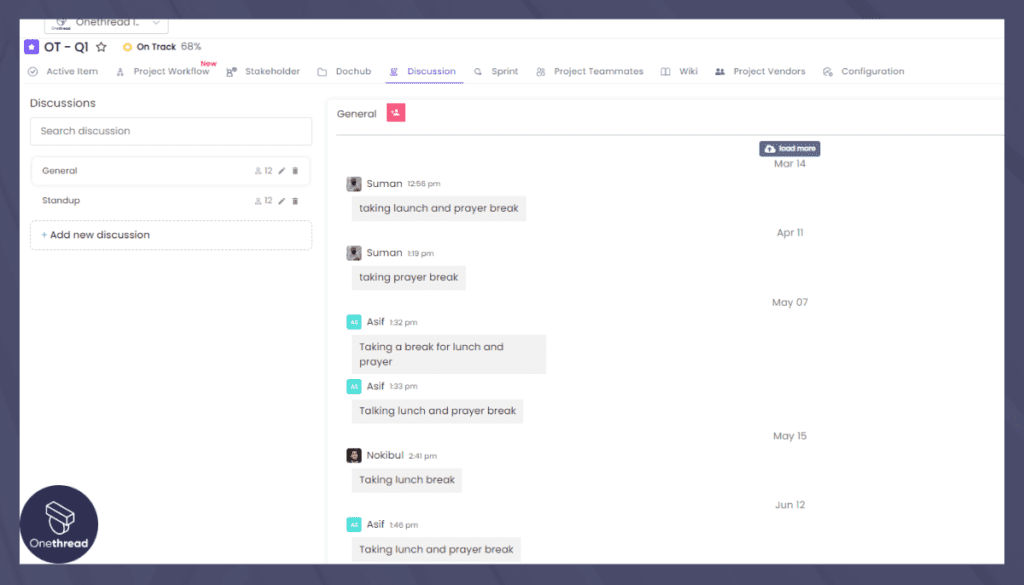
Risk Mitigation: Onethread’s risk management features allow you to identify and monitor potential risks. Having foresight into potential obstacles lets you plan contingencies, minimizing the likelihood of unforeseen delays.
Task Dependencies: Onethread allows you to create and visualize task dependencies. You can identify crucial tasks that, if delayed, might affect subsequent ones. This way, you can prioritize critical tasks and keep your project on schedule.

By integrating Onethread into your project management strategy, you’re not just bringing in a tool; you’re inviting in a partner that empowers you to navigate around potential delays and steer your projects toward successful and timely completion.
Final Words
Project delays, an all-too-common challenge in various industries, can significantly impact budgets, stakeholder trust, and overall project outcomes.
While certain external factors causing these delays might be uncontrollable, a proactive approach to management, clear communication, and strategic contingency planning can mitigate their adverse effects.
It’s essential to recognize the implications of such delays, not just from a financial standpoint but also in terms of reputation and opportunity costs.
By deploying the right tools, methodologies, and practices, organizations can navigate the complexities of project timelines more efficiently. Ultimately, understanding the root causes of delays and taking proactive measures is the key to timely project delivery and organizational success.
FAQs
1. Why are project delays a major concern in management?
Answer: Project delays are a primary concern in management because they can lead to increased costs, wasted resources, and potential penalties. Additionally, delays can harm a company’s reputation, strain relationships with stakeholders, and result in missed market opportunities. In essence, effective time management is crucial for achieving goals and ensuring organizational success.
2. What’s the difference between project delay and project playtime delay?
Answer: A project delay refers to any situation where tasks or phases in a project timeline take longer than initially planned, pushing the project’s completion date further out. On the other hand, project playtime delayed is not a standard term in project management. It might refer to the postponement of a specific phase or aspect of a project, often a less critical or non-essential part, allowing the primary tasks to remain on schedule.
3. How do different industries tackle the challenge of project delays?
Answer: Different industries have unique approaches to project delays:
- Construction: Implements buffer periods and lean construction methods to anticipate and manage delays.
- IT & Software: Uses agile methodologies and iterative development to adapt to changes and manage delays dynamically.
- Manufacturing: Employs lean manufacturing and Six Sigma to streamline processes and reduce the likelihood of delays.
- Healthcare: Uses evidence-based practices and clinical pathways to standardize care processes and reduce treatment delays
4. What tools are available to help avoid or manage project delays?
Answer: Various tools help in avoiding or managing project delays:
- Project Management Software (like MS Project or Trello): Helps in task tracking, resource allocation, and timeline management.
- Communication Tools (like Slack or Zoom): Ensure clear and consistent communication among team members.
- Time Tracking Tools (like Harvest or TimeDoctor): Monitor how much time is spent on specific tasks to identify potential bottlenecks.
- Risk Management Tools: Help identify potential risks early and create mitigation strategies.
- Gantt Charts: Visualize project timelines and monitor progress against set benchmarks.
5. Are there any universal solutions to prevent project delays across industries?
Answer: While specifics can vary across industries, several universal solutions can prevent project delays:
- Clear Communication: Ensuring all team members, stakeholders, and external partners understand project expectations, timelines, and roles.
- Resource Allocation: Properly allocating and managing resources, including time, money, and personnel.
- Contingency Planning: Anticipating potential risks and having backup plans in place.
- Regular Monitoring and Reviews: Continuously tracking project progress and making adjustments as necessary.
Stakeholder Engagement: Keeping stakeholders involved and informed can help in swiftly addressing challenges that might lead to delays.
